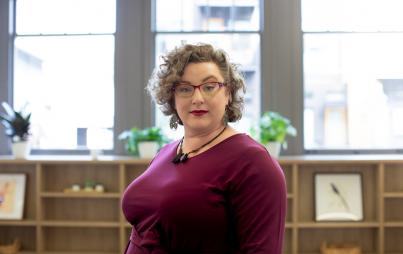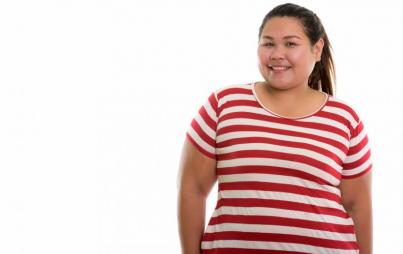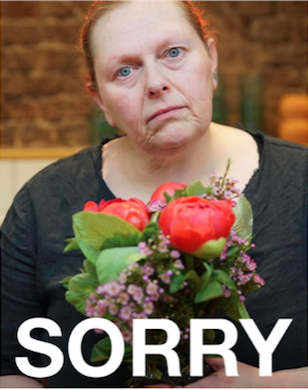
Lush issues a half-baked apology that should never have been necessary in the first place. (Image Credit: Instagram/@lush)
Lush Cosmetics is known for making environmentally friendly, ethically sourced products. I first wrote about them in 2015 when they rolled out an ad campaign in Australia and New Zealand to highlight their minimal packaging and commitment to body positivity.
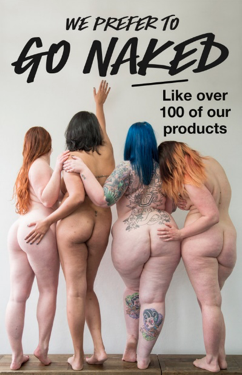
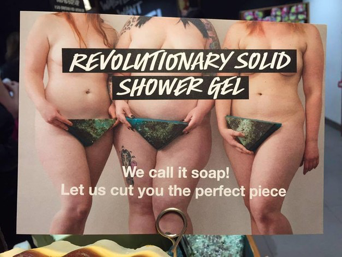
When a few people called the ads pornographic, Lush responded, “The photos are shot not to titillate but with the utmost respect for these wonderful human beings and their commitment to this cause. The image is completely untouched, as we feel that we should not be ashamed of our bodies in their natural state, and that every single one of us is beautiful in our diversity, regardless of colour, shape, size, or life choices."
How quickly they forget. Lush threw all that out the window to promote the screening of a movie called What the Health. Lush chose to post promotional materials from the film, including this one, to their Instagram:
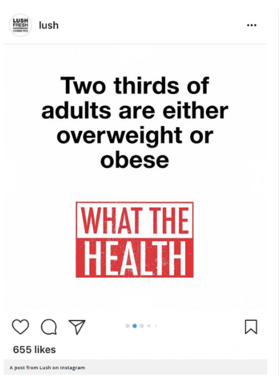
The reaction was swift and harsh as people pointed out that suggesting that fat people’s existence is a problem to be solved is fat shaming and, when combined with the movie promotion, healthist.
Lush apologized (sort of…)
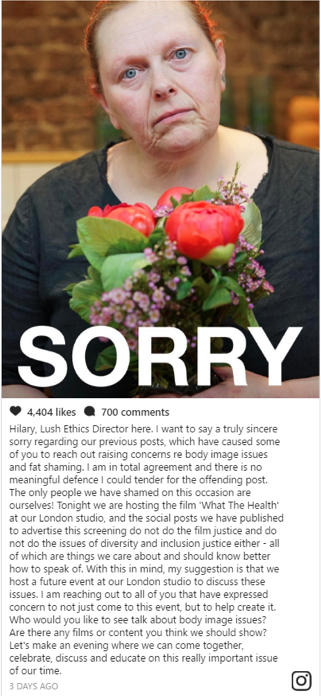
Let’s break this apology down:
"Hilary, Lush Ethics Director here. I want to say a truly sincere sorry regarding our previous posts, which have caused some of you to reach out raising concerns re body image issues and fat shaming. I am in total agreement, and there is no meaningful defense I could tender for the offending post."
So far, so good.
"The only people we have shamed on this occasion are ourselves!"
What? No! They very specifically shamed fat people. (And in other posts, they shamed people with cardiovascular issues.)
"Tonight we are hosting the film 'What The Health' at our London studio, and the social posts we have published to advertise this screening do not do the film justice and do not do the issues of diversity and inclusion justice either - all of which are things we care about and should know better how to speak of."
Hilary is talking nonsense. “…do not do the film justice?” The pictures they posted are media that was created by the film company — and the film is inherently problematic in terms of “diversity and inclusion justice.” Lush re-posting them is a problem. That they were created in the first place is a problem. Yet another film claiming to be “ground-breaking” when it engages in tired sizeism and healthism (and some really questionable math and statistics) is a problem. Choosing to screen this film is a problem, and choosing to screen it without a discussion of the issues of healthism, ableism, and sizeism (not to mention issues of accessibility, including racism and classism) is unconscionable.
"With this in mind, my suggestion is that we host a future event at our London studio to discuss these issues. I am reaching out to all of you that have expressed concern to not just come to this event, but to help create it. Who would you like to see talk about body image issues? Are there any films or content you think we should show? Let's make an evening where we can come together, celebrate, discuss and educate on this really important issue of our time."
You can find me at www.sizedforsuccess.com, I’ll see you there. In the meantime though, let’s not pretend that “fat people should not exist” and “fat people should be allowed to exist” are simply equal but differing opinions. The first is a statement of oppression, the second a statement of basic human rights. (I’m not even going to bother getting into the complexities of size and health because it doesn’t matter since people of all sizes, and all health statuses, have a right to exist without oppression.) While I and many other fat activists often take this type of opportunity to educate, it’s important to note that giving us the chance to debate for our right to exist isn’t, perhaps, as grand a gesture as they think it is.
The truth is that they were right the first time: “…we should not be ashamed of our bodies in their natural state, and that every single one of us is beautiful in our diversity, regardless of colour, shape, size, or life choices.”
Now I know some of you have your hands way up in the air like the kid in class who is desperate to be called on (which may or may not have been me in school.) And if I call on you, you’ll say “This isn’t about fat shaming, this is about health!!!” The thing is that believing that someone else’s health is your business is not a license to shame them for their body size, their health issues, or anything else.
This idea that public health means that the individual’s health is the public’s business becomes a slippery slope fast, since most people aren’t interested in being told how they have to live by other people. So, for example, vegans don’t feel like they should be forced to go paleo because some think it’s healthier, and people who play extreme sports don’t want to be forced to give up their sport and start taking brisk walks instead, to avoid expensive injuries.
“Health” (by whatever definition) is not an obligation, a barometer of worthiness, or guaranteed under any circumstance. Knowing that, each of us should get to choose how highly we prioritize our health, the path that we choose to get there, and who we want to involve in that process. We must acknowledge issues of access — especially in the United States where the current paradigm is that if we can’t afford to contribute “sufficiently” to the bottom line of massive for-profit corporations (including C-suite salaries that can reach $100,000 a day), then it’s completely acceptable that we should die.
But the issues extend further than that since medical providers’ bigotry and stereotypes (racism, homophobia, transphobia, sizeism and more) can make it all but impossible for some of us to get competent, compassionate, evidence-based care, not to mention that a culture that shames people for getting sick (as this movie’s marketing, Instagrammed by Lush, does) contributes to people not believing that they are worthy of good care.
So this kind of sizeism and health-shaming is wrong for everybody, but particularly wrong for a company like Lush, that wants to claim to be “body positive.”
Health (by whatever definition) is between each individual and the people they choose to involve. To be part of the "Body Positive Movement," you must advocate for affirmation and respect for bodies of all sizes, abilities, and health statuses, regardless of your beliefs about anybody's health. Body Positivity doesn't have health, ability, or size requirements — we leave that to healthism, ableism, and sizeism.





